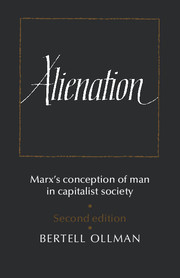Book contents
- Frontmatter
- Contents
- Preface to the second edition
- Note on translations
- Acknowledgements
- General introduction
- PART I PHILOSOPHICAL INTRODUCTION
- PART II MARX'S CONCEPTION OF HUMAN NATURE
- PART III THE THEORY OF ALIENATION
- 18 The theory of alienation
- 19 Man's relation to his productive activity
- 20 Man's relation to his product
- 21 Man's relation to his fellow men
- 22 Man's relation to his species
- 23 The capitalist's alienation
- 24 The division of labor and private property
- 25 The labor theory of value: labor-power
- 26 Value as alienated labor
- 27 The metamorphosis of value
- 28 The fetishism of commodities
- 29 Class as a value Relation
- 30 State as a value Relation
- 31 Religion as a value Relation
- 32 Marx's critique of bourgeois ideology
- PART IV CONCLUSION
- Appendix I In defense of the philosophy of internal relations
- Appendix II Response to my critics: more on internal relations
- Notes to the text
- Bibliography of works cited
- Index of names and ideas
- Cambridge Studies in the History and Theory of Politics
18 - The theory of alienation
Published online by Cambridge University Press: 05 June 2012
- Frontmatter
- Contents
- Preface to the second edition
- Note on translations
- Acknowledgements
- General introduction
- PART I PHILOSOPHICAL INTRODUCTION
- PART II MARX'S CONCEPTION OF HUMAN NATURE
- PART III THE THEORY OF ALIENATION
- 18 The theory of alienation
- 19 Man's relation to his productive activity
- 20 Man's relation to his product
- 21 Man's relation to his fellow men
- 22 Man's relation to his species
- 23 The capitalist's alienation
- 24 The division of labor and private property
- 25 The labor theory of value: labor-power
- 26 Value as alienated labor
- 27 The metamorphosis of value
- 28 The fetishism of commodities
- 29 Class as a value Relation
- 30 State as a value Relation
- 31 Religion as a value Relation
- 32 Marx's critique of bourgeois ideology
- PART IV CONCLUSION
- Appendix I In defense of the philosophy of internal relations
- Appendix II Response to my critics: more on internal relations
- Notes to the text
- Bibliography of works cited
- Index of names and ideas
- Cambridge Studies in the History and Theory of Politics
Summary
The theory of alienation is the intellectual construct in which Marx displays the devastating effect of capitalist production on human beings, on their physical and mental states and on the social processes of which they are a part. Centered on the acting individual, it is Marx's way of seeing his contemporaries and their conditions (a set of forms for comprehending their interaction) as well as what he sees there (the content poured into these forms). Brought under the same rubric are the links between one man, his activity and products, his fellows, inanimate nature and the species. Hence, as a grand summing up, as Marx's conception of man in capitalist society, the theory of alienation could only be set out after its constituent elements had been accounted for.
For purposes of discussing alienation, the following points, made early in Part I and illustrated in subsequent chapters, will serve as my philosophical charter: Marx's subject matter comprises an organic whole; the various factors he treats are facets of this whole; internal relations exist between all such factors; reciprocal effect predominates and has logical priority over causality; laws are concerned with patterns of reciprocal effect; the concepts Marx uses to refer to factors convey their internal relations; this makes it possible to speak of each factor as an ‘expression’ of the whole (or some large part of it) or as a ‘form’ of some other factor;
- Type
- Chapter
- Information
- AlienationMarx's Conception of Man in a Capitalist Society, pp. 131 - 135Publisher: Cambridge University PressPrint publication year: 1977



